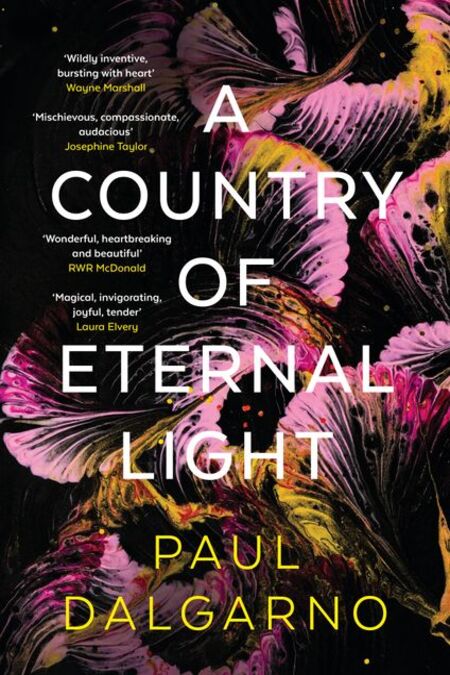Death, to our never-ending despair and ever-present grief, is a very final thing.
That’s not necessarily a commentary on life-after-death or any of the philosophical or religious beliefs that evoke ideas of what happens to our supposedly incorruptible souls; it’s more a resigned acknowledgement that when somebody passes away, that’s it for their presence in this world and our lives.
We don’t see them anymore, we don’t laugh with them, we simply lose them in their entirety, memories and their place in our heart aside, and that, heartbreakingly, is that.
Or is it?
For us, lamentably, yes, but in Paul Dalgarno’s richly affecting novel, A Country of Eternal Light – the title is drawn, rather poetically, from Mary Shelley’s Frankenstein – it may not be the end for the dead.
In this breathtakingly imaginative story, that seamlessly pours some big emotions and huge ideas into an intimately moving exploration of what life looks like to the person who has just shuffled off this mortal coil and how those who remain in the land of the living never stop missing the loved one they have lost, Dalgarno takes us on a remarkable journey through time as Margaret Bryce is forced, for reasons that mystify and dissatisfy her, to relive a random selection of meaningful moments from her past and from her present which, post-2014, is taking place after she should be lost to the oblivion of death.
I’ve heard this response from Henry so many times that on most occasions it no longer registers, but today … I blame henry for everything, or not everything, just the bad things. Drag the worst moment of my life into a quiet room and squeeze it – undoubtedly the sound it will make is: Henry.
But she isn’t, and while she is glad in some ways to still have contact with her twin daughters, Eva and Rachel, who live in Madrid, Spain and Melbourne, Australia respectively, and to have the chance to be tangentially related to life and its many mysteries, delights and frustrations, she can’t work out why it is that she has just wafted to somewhere, anywhere else.
Her greatest bugbear is that she has no control over where she goes in time and what she sees and so she may one day be in Melbourne watching Rachel mourning her deceased mother with her wife gem and two sons and another be inside the psych hospital where estranged husband Henry is once seeking treatment for trenchant mental health issues.
Written with good humour, real empathy and an understanding of the blurred lines between life and death, no matter how final it may all feel, A Country of Eternal Light is a stunningly original piece of work than appreciates how hard it is to face up to your past and to find some sort of peace with it.
Time and again we come to realise that when you take in the enormity of someone’s life armed with the perspective of years hence when you know how certain situations are going to play out, that a whole lot of things suddenly make more sense, or aren’t as alarming dark as they first appeared.
That doesn’t make them any easier to live through, of course, even the second time around, especially when death doesn’t grant you magical powers of recall and you struggle to remember, much like when you’re flicking through a box full of photos in no particular order, why something is happening or why someone you think should be there simply isn’t.

What is so richly moving about A Country of Eternal Light which feels like a photo album sprung vividly and Ghost of Christmas Past and Present to life, is that for all its cleverness of approach and imaginative originality which could easily become a smart narrative device and nothing more, it feels so drenched in love-filled, broken and regret-filled humanity.
Margaret loves her daughters and grandsons, retains considerable affection for her husband and misses her friend Barbs and so much of this wondrously alive novel is filled to bountiful thoughtfulness with the good and lovely things life gives us.
But A Country of Eternal Light is also ruminative and meaningfully thoughtful, quietly surging with the fact that for all the tender moments and heartfelt exchanges, that there remain a great many other things which can never be repaired, not simply because they are in the past but because, in Margaret’s case, any chance for enacting closure shut firmly on her when she died of cancer.
This is not some sort of Christmas Carol romp into changed lives or reshaped circumstances; everyone remains much as they were at the start of the novel – save for Margaret who, obliquely it seems, does find the “goodnight” she has been searching for – but it does provide a sense to our wandering non-corporeal spirit, who is more tired than she’s ever been, that our lives have meaning far beyond what we can see at the time.
It’s the early eighties. I know that much. Assuming any of this is accurate or has a meaning … What’s the meaning, Margaret? Can you pin down a pattern? Is there a reason for all these re-runs? I’d like to laugh about it – if you’d heard my chortling, once upon, I mean …
That’s really what strikes you most strongly about A Country of Eternal Light.
It’s that sense that while we might feel like we have failed or that a particular point in life is irredeemably bad, that everything eventually works out.
Maybe not as we planned, and certainly, preferably not in death, but it does find resolution in some form, even half-done, and that maybe death is less a case of doors shutting with booming finality than a chance to see our lives from a whole other vantage point and to realise that perhaps it was better than we thought.
Or, that at least we achieved more and got far more out of it than our limited mortal perspective afforded us.
A heartrendingly, very funny examination of life and death, grief and what happens to those we leave behind, A Country of Eternal Light is one of those bravely audacious books that scoops up a massive amount of humanity and love and connection and marvels at its size and scope and meaning.
None of it is is perfect, and Margaret can point to many instances where her life failed to manifestly meet expectations, but as she bounces like a pinball from memory bumper to memory bumper, she comes to appreciate, even as she remains mystified that she’s on this journey at all, that there might be value in facing up your past, even unwillingly, especially if it reminds you that you lived more richly and successfully than you thought (and that you somehow survived the great pain of terrible loss), and that that is why you mourned as fulsomely and lastingly as you are.
